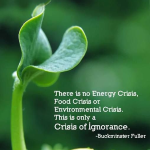
Slowing Down Population Growth by PopControl
 Jan Kunnas May 7, 2015 03:33 |
Dear Emilia,
I agree that slowing down population growth is an important goal for various reasons. I am, however, not convinced that it would be very effective means to cut greenhouse gas emissions. The "countries" mainly responsible for climate change due to cumulative emissions are the United States, the European Union and China: http://www.tandfonline.com/doi/full/10.1080/03585522.2014.896284#.VUu8G_ntmko
They all have been successful in slowing down population growth, but without similar effects on GHG emissions.
Empowerment of women through education is, however, important not only as a mean to slow down population growth, but also an efficient tool to increase the resilience in the face of climate change.
|
 Emilia Hull May 8, 2015 02:59 | Proposal contributor
Hi Jan,
I agree with you: the countries most responsible for carbon emissions - both currently and historically - often are either at or below replacement level population-wise.
Yet with current development trends, many countries that still have booming populations are increasingly using more CO2 per person. Though this is still well below CO2 consumption levels in most Western countries, even small increases when spread across a large population amounts to a significant increase overall.
I think that Western countries need to take more responsibility for their past and present actions and step up as environmental leaders, drastically cutting emissions. But the fact is that CO2 is not the only problem currently driving climate change - there is also the negative effects of depleting our fresh water sources and overworking our arable land. These two problems are often directly linked to increasing populations, which are expanding into previously untouched territories and significantly damaging ecosystems worldwide in search for food and water, which are become even scarcer as we burn through available fresh water sources and push arable lands past their limits with monoculture crops and no breaks.
The easiest way to leave certain ecosystems still intact, and help ecosystems bounce back and support the people already living in the area, is to reduce the population these limited lands have to sustain. This can happen a number of ways: converting crops into fields rather than grazing grounds, planting native species and trees around borders to help stabilize the topsoil, leaving fields bare for a year between seasons to recover, etc. But the most direct way is to not force an acre that previously supported 20 people into having to now support 200.
|
 Michael Hayes May 12, 2015 09:37 |
Hi Emilia and Jan,
I and others are proposing the development of a oceanic civilization robust enough to absorb a large portion of additional population growth as well as get us to a carbon negative scenario.
My work can be found in early draft of:
The Intergovernmental Marine Bio-Energy and Carbon Sequestration (IMBECS) Protocol
https://docs.google.com/document/d/1zMD-k9QLS9TfEGDpaQptGBqdtXa-1NCx5oNKvEjrL8Y/edit
Good work Emilia,
Michael
|
 Jan Kunnas May 13, 2015 03:01 |
A new Atlantis? Sounds interesting!
|
 Emilia Hull May 14, 2015 01:58 | Proposal contributor
Impressive work Micheal. Very out-of-the-box thinking.
|